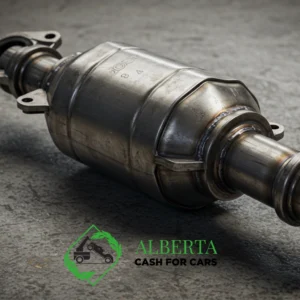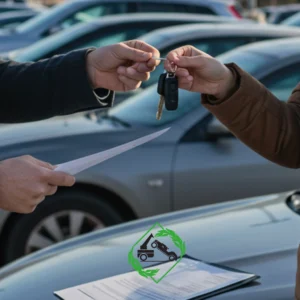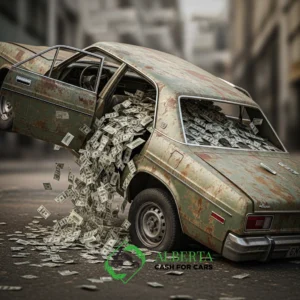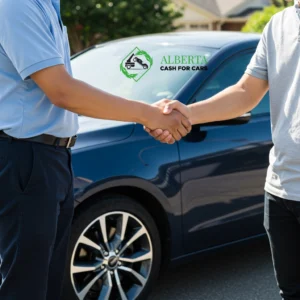Imagine this: you’re cruising down the road, music playing, when suddenly – bam! Another car cuts you off, and you end up in a ditch. The car is mangled, and your heart sinks. Is it totaled? What does that even mean?
Getting into an accident is a stressful experience. Beyond the potential injuries and dealing with repairs, there’s the question of what happens to your car if it’s deemed a total loss. This is where understanding totaled car insurance payout comes in.
Don’t worry, we’ve all been there (well, hopefully not literally in a ditch!). This guide will walk you through everything you need to know about totaled car insurance payouts, from understanding the process to maximizing your payout and even what to do with the wreckage itself.
Understanding The Definition of Totaled Car Insurance Payout

So, what exactly is a totaled car? In insurance terms, a car is considered totaled when the cost of repairs exceeds its actual cash value (ACV). Think of it this way: if it’s cheaper for the insurance company to buy you a new (well, used) car than to fix yours, then it’s considered a total loss.
Here’s where things get real: how much will your insurance company pay for your totaled car? This depends on a few factors:
Actual Cash Value (ACV)
The Actual Cash Value (ACV) of your car is its estimated market value before the accident. Insurance companies use various valuation tools, such as Kelley Blue Book, to determine the ACV, considering factors like:
- Year, Make, and Model: Newer models generally have higher ACV compared to older models.
- Mileage: Lower mileage vehicles tend to have higher ACV.
- Condition: The overall condition of the car, including any existing damage or wear and tear, impacts its value.
- Market Value: Current market trends and demand for similar vehicles can influence the ACV.
Extent of Damage
The severity of the damage to your vehicle plays a significant role in determining whether it’s totaled. Even seemingly minor damage, such as a significant dent or a broken windshield, can affect the car’s structural integrity and safety features. If the cost of repairs exceeds the vehicle’s ACV, it’s likely to be considered a total loss.
Insurance Coverage
Your insurance coverage will determine the extent of your payout for a totaled car.
- Collision Coverage: This coverage pays for damages to your car caused by a collision with another vehicle or object. If your car is totaled in an accident, collision coverage will typically cover the ACV of the vehicle, minus your deductible.
- Comprehensive Coverage: This coverage pays for damages to your car caused by non-collision events, such as theft, vandalism, or natural disasters. If your car is totaled due to a non-collision event, comprehensive coverage will typically cover the ACV of the vehicle, minus your deductible.
It’s important to review your insurance policy to understand your specific coverage and limits.
So, What Next?
Now, let’s say the adjuster (the insurance company representative who assesses the damage) deems your car totaled. Here’s what typically happens next:
- The adjuster inspects your car: They’ll take photos, assess the damage, and gather information about your car’s condition.
- The insurance company calculates the ACV: They’ll use industry resources and their own formulas to determine the pre-accident value of your car.
- You receive a settlement offer: This will be for the ACV, minus your deductible (the amount you pay out-of-pocket before insurance kicks in).
Some Useful Negotiation Tips
Do Your Research
Before negotiating with your insurance adjuster, take the time to research your car’s value. Use online resources like Kelley Blue Book, Edmunds, or other reputable car valuation tools to determine the fair market value of your vehicle. Consider factors such as the car’s age, mileage, condition, and any recent upgrades or modifications.
Gather Supporting Documentation
Collect any relevant documentation that can support your claim for a higher settlement. This may include:
- Maintenance Records: Keep records of regular maintenance, such as oil changes, tire rotations, and brake replacements.
- Repair Receipts: If you’ve recently made any repairs or upgrades to your car, keep the receipts as proof of additional value.
- Photos of the Vehicle: Take photos of your car before and after the accident to document the extent of the damage.
Negotiate with Your Insurance Adjuster
Be prepared to negotiate with your insurance adjuster to ensure you receive a fair settlement. Here are some tips:
- Be Polite and Professional: Maintain a calm and respectful demeanor throughout the negotiation process.
- Know Your Rights: Familiarize yourself with your insurance policy and state laws to understand your rights as a policyholder.
- Present Your Case: Clearly explain your reasons for believing the initial offer is too low. Refer to your research and documentation to support your claims.
- Be Patient: The negotiation process may take time. Be patient and persistent in your efforts to reach a fair settlement.
- Consider Mediation: If you’re unable to reach an agreement with your insurance adjuster, consider seeking mediation from a neutral third party.
Dealing with a Financed Car

If your totaled car was financed, the process becomes a bit more complex. Here’s what you need to know:
Contact Your Lender Immediately
As soon as you realize your car is totaled, contact your lender to inform them about the situation. Provide them with details about the accident, the insurance claim, and the expected payout. Your lender will work with your insurance company to ensure that the loan is paid off in full.
Understand Your Insurance Coverage
Review your insurance policy to determine your coverage for a totaled vehicle. Pay close attention to your collision coverage and comprehensive coverage limits. If your vehicle was financed, you may also have gap insurance.
Gap Insurance: A Crucial Coverage
Gap insurance can be a valuable asset when dealing with a totaled financed car. It covers the difference between your vehicle’s actual cash value (ACV) and the amount you still owe on the loan. If your car is totaled, and the insurance payout is less than the outstanding loan balance, gap insurance can help bridge the gap.
Related Post:
Selling a Car Without Insurance | Challenges, Risks and Smart Solutions
Work with Your Insurance Company
Your insurance company will handle the claims process, including assessing the damage, determining the ACV, and issuing a settlement check. Be prepared to provide documentation, such as the vehicle’s title, registration, and any recent repair records. Communicating openly and honestly with your insurance adjuster is important to ensure a smooth claims process.
What Happens to the Totaled Car?
Once your insurance company pays out the claim, they’ll likely take possession of the vehicle. They may sell it to a salvage yard, where it can be dismantled for parts or recycled.
Should You Buy Back Your Totaled Car?

In some cases, you might have the option to buy back your totaled car from the insurance company. This can be a good option if you’re mechanically inclined and want to fix the car yourself. However, it’s important to weigh the costs and potential risks before making a decision.
A Word on Alberta Cash for Cars
While not directly related to totaled cars, Alberta Cash for Cars can be a valuable resource for selling your car, even if it’s not totaled. They offer a quick and hassle-free way to sell your vehicle, regardless of its condition.
No Hassle, Just Cash — Book Your Free Pickup or Quote Today!
Conclusion
Dealing with a totaled car insurance payout can be a stressful experience, but by understanding the process and taking the right steps, you can navigate the situation smoothly. Remember to document everything, communicate with your insurance company, and explore all your options.
Whether you’re looking to sell your totaled car to a salvage yard or a company like Alberta Cash for Cars, getting a fair deal is essential. By doing your research, knowing your rights, and staying informed, you can make informed decisions and protect your financial interests.







